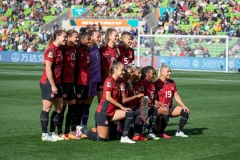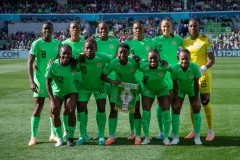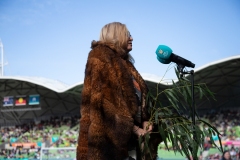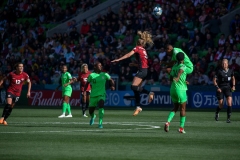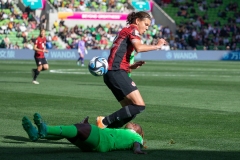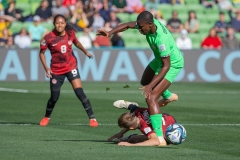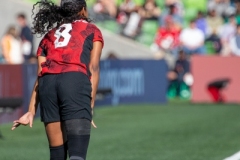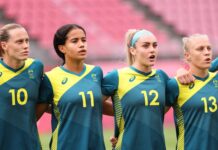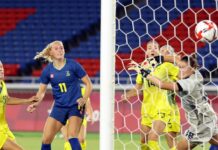

| Head Coach: | Bev Priestman | Group: | E |
| Confederation: | CONCACAF | Ranking: | 8 Highest 4 (2016) Lowest 13 (2005) |
| Federation: | Canada Soccer | ||
| Social Media: | |||
Like their North American neighbours the United States, Canada has been among the most blessed of any women’s football national team in terms of raw talent over the last two decades. A strong sporting culture, wealth of homegrown players, and proximity to the American college system and senior leagues has consistently seen the country produce world-class players all over the field. Players like 20-year veteran and member of the first-ever team Charmaine Hooper, five-time World Cup representative Karina Leblanc, current assistant coach Melissa Tancredi, and all-time great Christine Sinclair have been among the brightest lights in international football since Canada’s first match in 1986.
Despite these stars of the international game, Canada has historically struggled to breakthrough and find international success at the World Cup. Qualifying for every edition since 1995, the team has made the semi-finals just once (USA 2003), and fell at the quarter-final stage to eventual third-place finishers England in 2015.
Strangely enough, Canada has found success almost exclusively in Olympic competition; despite first qualifying for the tournament in 2008, Canada has grabbed a medal in two of its three Olympic appearances, picking up bronze at both London 2012 and Rio 2016.
Squads
Goalkeepers
- Stephanie Labbe
- Erin McLeod
- Kailen Sheridan
Defenders
- Kadeisha Buchanan
- Gabrielle Carle
- Allysha Chapman
- Vanessa Gilles
- Ashley Lawrence
- Jayde Riviere
- Shelina Zadorski
Midfielders
- Jessie Fleming
- Julia Grosso
- Quinn
- Desiree Scott
- Sophie Schmidt
Forwards
- Janine Beckie
- Jordyn Huitema
- Adriana Leon
- Nichelle Prince
- Deanne Rose
- Christine Sinclair
- Evelyne Viens
Coach
In 2020, long-time coach John Herdman moved into the Canadian men’s team set-up, and Kenneth Heiner-Møller returned to his homeland Denmark to take up a position with their national federation. Canada Soccer announced then-England under-17 women’s coach and senior women’s team assistant Bev Preistman would fill the vacant role.
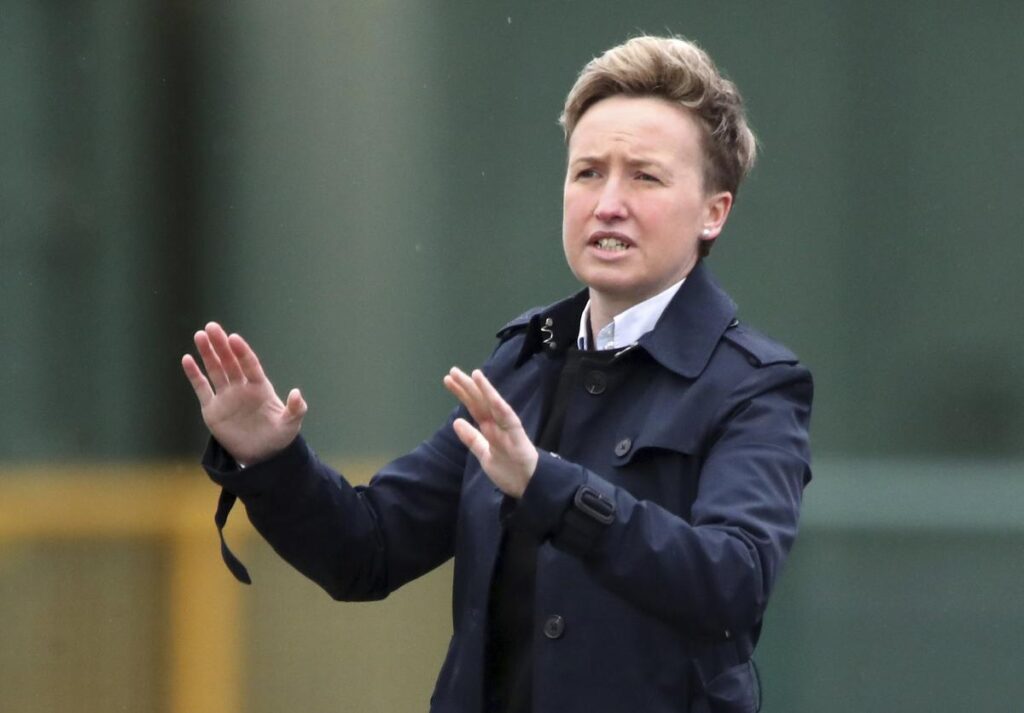
Priestman is well-known to many of the current group of players through her previous work as a youth coach and as seniors assistant. Working alongside Herdman from 2013 to 2018, she took Canada’s Under-17s within 12 yards of a CONCACAF Championship in 2013, where they lost on penalties to Mexico, as well as to the quarter-finals of the 2014 World Cup. Priestman will be looking to add to her already-impressive resume and take her adopted nation to Olympic success.
Last Olympics
Having qualified as runners-up at the 2016 CONCACAF Olympic Qualifying Tournament, Canada was placed in Pot Three for the Rio 2016 tournament draw, along with 12th-ranked China and world number 16 New Zealand. Eventually drawn in Group F, Canada defeated Australia (2-0), Zimbabwe (3-1), and Germany (2-1), before Sophie Schmidt’s second-half goal dragged the side past France in their quarter-final in Belo Horizonte.
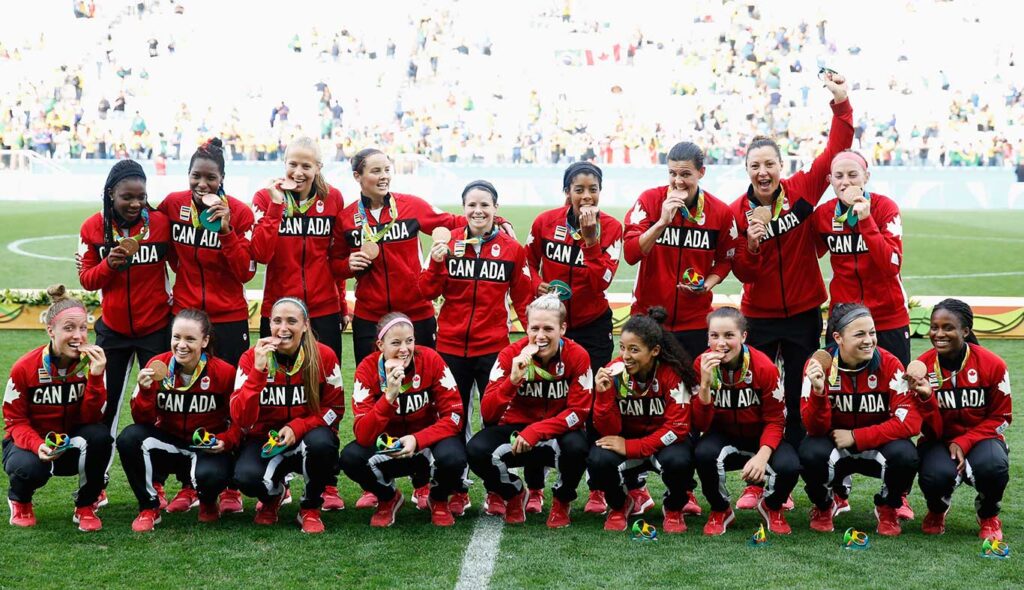

Facing Germany once more for a place in the Gold Medal match, Herdman’s side succumbed to a 0-2 defeat to Die Nationalelf, with Melanie Behringer and Sara Däbritz breaking the team’s stiff resistance either side of half time. However, with a medal on the line, Canada once again stepped their game up a level, dispatching the home nation 2-1 at Arena Corinthians in São Paulo. A brilliant 80-yard breakaway from Ashley Laurence handed Deanna Rose the opening goal on a platter, before captain Sinclair celebrated her 250th cap with a close-range finish – her 11th goal in Olympic tournaments – after lead-up work from Rose and Jessie Fleming. Despite their best efforts and Beatriz’s swivelling left-footed volley, the medal was Canada’s to claim, clinching the nation’s second consecutive bronze in front of 38,000 broken-hearted Brazilians.
Read more: Brazil Olympic Preview
Qualifying Path
As with the previous two Olympic qualification campaigns, Canada was confident in its ability to feature in Tokyo – even before the COVID-19 pandemic threw preparations and the tournament as a whole into disarray. Drawn against Mexico, Jamaica, and St Kitts & Nevis, Canada strolled through the group phase without conceding a single goal. Tey recorded 2-0, 9-0, and 11-0 victories respectively as Adriana Leon, Janine Beckie and Jordyn Huitema all racked up hat-tricks in the process.
Continuing that stellar defensive form into the semi-final, Canada defeated a stubborn Costa Rica side 1-0 thanks to the least-convincing close-range finish you’ll ever see from Huitema, before facing newly-crowned World Cup champions the United states in the tournament final. Seeking to limit the damage surely about to rain down on them by employing a 5-3-2 formation, Canada’s game plan held strong until just before the hour mark when former Western Sydney striker Lynn Williams opened the scoring. Looking to press the advantage, the Americans brought on Megan Rapinoe and Sam Mewis, before Horan doubled the lead with 20 minutes to play, allowing the substitute Rapinoe to seal the deal in the closing minutes.
Read more: USA Olympic Preview
The Strengths
Canada’s squad is blessed with a number of quality players who could slip into almost any starting line-up in the world. Leon and Huitema’s poachers’ instincts, Jessie Fleming’s work rate in midfield, Buchanan’s prodigious defensive talent, and of course Sinclair’s brilliant longevity would all be welcome additions to any line-up. Those talents – and ones equal that preceded them – have brought Canada silverware in the past, including the country’s two Olympic bronze medals, the 2020 CONCACAF Championship, and the 2011 Pan-American Games gold medal. With young, college- and NWSL-experienced players filtering into the national team to support the world-class players embedded in the current system, there’s no reason Canada can’t go all the way in Tokyo.
The Challenge
Canada’s greatest challenge has been for so long putting all these talents together in the biggest games. Handily beaten by the Netherlands in the 2019 World Cup round of 16, and by Germany in the semi-final of the Rio 2016 Olympics, Canada has stumbled before the final hurdle on so many occasions over the past decade. Once out of the group stage, winning through the knockouts – even with its world-class line-up – will again be Canada’s toughest task.
Key Players
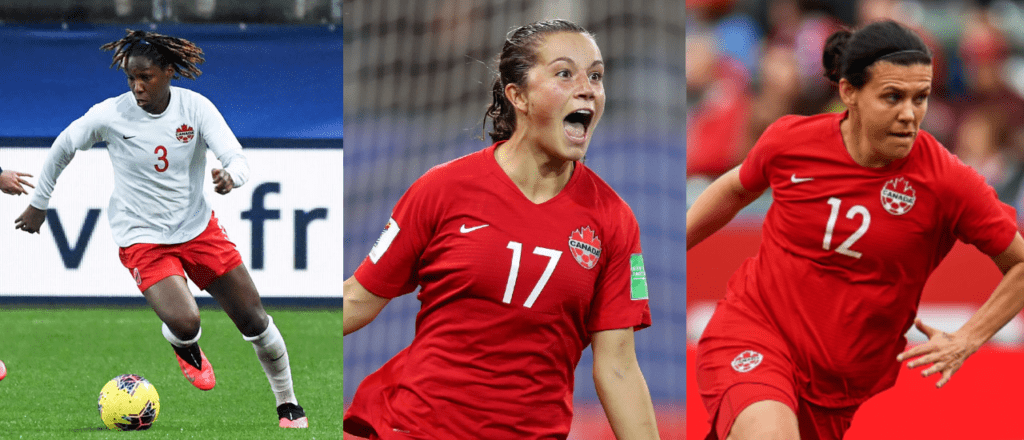

Kadeisha Buchanan
Born in Toronto to Jamaican parents, Kadeisha Buchanan burst onto the global scene as a raw 19-year-old wingback at her home World Cup in 2015. After winning the Best Young Player award at her début tournament, Buchanan graduated from West Virginia University in 2016 and signed with French side Lyon.
Now a four-time European champion and having cemented her place in the centre of Lyon’s defence alongside France captain Wendie Renard, 25-year-old Buchanan has also become a mainstay in the national team, conceding just 12 goals in her 18 matches since 2019. With a strong aerial presence and brilliant organisation, Buchanan will again be among the defenders to watch in Tokyo.
Jessie Fleming
Another Ontarian, Jessie Fleming made her international debut at the age of 15 having already captained the country’s Under-17 team during their World Cup qualification. Touted as “The Next Sinclair” before even playing college soccer, Fleming joined UCLA in 2016, guiding her Bruins to a College Cup appearance in her second year before being named in the All-Pac 12 Team in her third.
With a Bachelor of Materials Engineering under her belt, Fleming signed a two-year deal with FAWSL side Chelsea, moving as a free agent to the Blues in the 2020 summer transfer window. She made her first senior appearance as a substitute against Manchester City that August.
Usually played as a box-to-box midfielder in a team with the flexibility to play either a possession-based or counter-attacking style, Fleming’s role in breaking up opponents’ play and controlling the tempo will be crucial in her side repeating its previous Olympic successes.
Christine Sinclair
There are two generations of Canadian football: BCE and CE – the Before Christine Era, and the Christine Era. The greatest goalscorer in the history of international football, and one of Canada’s greatest-ever athletes, Christine Sinclair is for many people the alpha and omega of Canadian football. Scoring more than 100 goals in her college career at the University of Portland and winning countless awards along the way, Sinclair has continued banging them in like it’s going out of fashion.
With almost 200 goals and 300 caps since her international debut in 2000, there’s not much that hasn’t already been written about Sinclair’s brilliance on the pitch and her immense influence off it. A leader among her peers, a ruthless finisher, a wily creator, and a tireless competitor, Sinclair’s will to win is matched only by her humility in victory and honesty in defeat.
Playing either as a centre-forward or in the hole behind the strikers, Sinclair’s ability to find the net in crucial moments – as she did in the 2016 Bronze Medal match – is still unmatched. While she may be in the twilight of her career, anyone who counts her out of the race for another medal is asking to be made a fool of.
One to watch – Jordyn Huitema
One of a handful of players in the Canadian squad born after its captain made her international début, British Columbia-born striker Jordyn Huitema’s career already mirrors her skipper’s at a similar age. Part of the Vancouver Whitecaps academy set-up from a young age, Huitema played with French side Paris Saint-Germain from 17, before deciding to forgo a college scholarship and turn pro in 2018, signing a four-year deal with PSG the following year.
Huitema has gone from strength to strength with the Parisiennes, scoring 10 goals over two seasons, including the goal to secure PSG its first-ever French league title. Able to play as a winger or central striker, look out for Huitema partnering with Sinclair and Leon as part of a 4-3-3 formation, where her technique and ability to drive past defenders will cause headaches all tournament long.
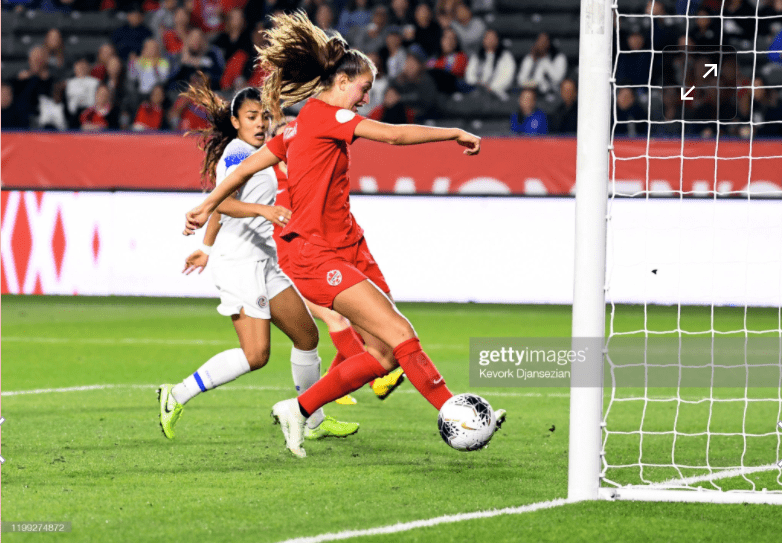

Prediction
It feels harsh – almost cruel – to consign Canada to a third-successive bronze medal, but such an outcome feels pre-ordained. Obviously capable of winning its group, Canada would likely face either Australia or Sweden in the quarter-finals, with the winner advancing to a likely knock-out game against the United States. With this in mind, and knowing Canada’s propensity for being the best of the rest, expect the team to comfortably win the third-place playoff to pick up its third bronze in a row.
Matches
| Date | Local Time | AEST | Venue | Team A v Team B |
| 21/7/2021 | 5:30 PM | 6:30 PM | Sapporo Dome | Japan vs Canada |
| 24/7/2021 | 4:30 PM | 5:30 PM | Sapporo Dome | Chile vs Canada |
| 27/7/2021 | 8:00PM | 9:00 PM | Kashima Stadium | Canada vs Great Britain |
Follow Beyond 90's coverage of the Olympics.


